A new “Avatar” awakens: Inside “The Last Airbender”’s live-action reincarnation

Water, earth, fire, and air converge as the stars and creative team behind the fantasy reimagining of a beloved animated show lay out what the legions of cross-generational fans can expect.
“Boomerang’s flying!” is a phrase stunt coordinator Jeff Aro found himself shouting a lot while hanging with the cast of Avatar: The Last Airbender in mid January. The reason? Sokka, of course.
On a hot set at the Sunset Bronson Studios in Hollywood for EW’s cover shoot, Aro works with the four stars of the highly anticipated Netflix fantasy series to warm up their martial arts-inspired battle moves. Actor Gordon Cormier’s muscle memory quickly activates as he begins twirling Aang’s signature airbending staff, while Kiawentiio’s arms begin flowing almost like waves to emulate the waterbending abilities of the mononymous actress’ character, Katara. And their costar Dallas Liu casually stuns the room as he executes an unscripted air flip for cameras against a backdrop of real flames. (We told you it was a hot set.) “It just comes from my martial arts background, so I got it in my back pocket whenever we want to get a cool shot,” says the actor, who plays firebender Prince Zuko.
Then there’s Ian Ousley. While a martial artist in his own right, his character of Sokka is the rare member of the series’ core “Team Avatar” group who can’t manipulate one of the four natural elements. Instead, he has his trusty boomerang, a prop Netflix flew out to the location especially for the actor. “That’s kind of my whole personality,” Ousley jokes. Before shooting his big hero moment — tossing said boomerang — he motions for everyone to get back. He refuses to even start until he can see most of the crew standing at an acceptable distance away. “This thing’s made out of pure steel,” Cormier remarks, playfully miming what would happen if Ousley accidentally knocks him in the head. Thankfully, both costars are nimble, and Gordon catches it off camera before the four assemble on stage for their money shot.
“Twelve-year-old me would be so happy right now,” Aro mutters as he looks over the playback on the monitors.
All four young stars are equally vibrating with excitement at the thought of getting to talk about the new Netflix adaptation (which premieres Feb. 22). It’s something they haven’t been able to do since they shot it years earlier and are only now reuniting for a promotional tour. (For context, Cormier auditioned for the titular role at age 11 and is now 14. “I was cast at 14 and I’m about to be 18,” adds Kiawentiio.)
Still, they’re younger than the original Avatar, which emerged in 2005 as a Nickelodeon animated series and drew in legions of fans to its fantasy world of benders — individuals with the power to control either water, earth, fire, or air, and the singular Avatar able to manipulate all four. “It was abundantly clear that this was probably one of the only things where I could see people like me on these kids shows,” comments Elizabeth Yu, 21, who now portrays the live-action Princess Azula. “There's something very magical about that.”
But the true magic of Avatar, much like its titular reincarnating figure, was its ability to cross generations. Over the course of three seasons — as well as a sequel series, The Legend of Korra; companion books; comics; and video games — the franchise tackled concepts of morality, spirituality, found family, and other themes that went well beyond the bounds of a mere kids show. It also just happened to showcase some of the most exciting feats of animation on television.
Albert Kim, a former EW editor who now spearheads the live-action series as showrunner, is one of countless adults passionately invested in this material, having initially intended to watch the cartoon in order to explain its context to his daughter. “I thought she was going to have trouble understanding the story, but pretty soon the explanations fell by the wayside,” Kim recalls. “I was just watching alongside her, just pulled into this incredible world…. It was the memories I had with my daughter that really sold me on the idea of doing this.”
It’s this love from seemingly disparate fan groups that has long piqued Hollywood’s interest in creating a live-action version. M. Night Shyamalan notably made a 2010 movie called The Last Airbender — so as not to confuse it with James Cameron’s Avatar. That effort was quite spectacularly read to filth by every corner of the fandom at the time. And the critics didn't care for it, either. White actors were cast to play Asian and Indigenous figures, the special effects couldn’t hold a candle to the theatrics of the original animation, and all of season 1’s main events were skimmed over in less than a two-hour runtime. (Kim purposefully avoided watching the movie. As of press time, he still hasn’t seen it.) Now, with the benefit of modern VFX, authentic casting, a format of eight hourlong episodes, and a renewed faith in the anime-to-live-action Hollywood cycle (thanks, One Piece!), the next Avatar is looking — to quote the original intro — to change the world.
A world on fire

Kim previously confirmed Avatar: The Last Airbender does not begin the same way as the animated series. Though the opening maintains familiar elements, Jabbar Raisani, the executive producer and visual effects supervisor who directed the new sequence, had one goal: “We just wanted to make sure audiences didn’t think they were getting a kids’ show. We want to ensure that our show is for all ages."
Aang, a young and spirited airbender, discovers he’s the next Avatar, a reincarnated being who emerges every lifecycle. Serving as a bridge between the human and spirit worlds, the Avatar uses their unique dominion over all four elements to maintain balance. But Aang has been mysteriously missing for 100 years, which has allowed the Fire Nation to ignite a war for global domination that already wiped out the Air Nomads — an event the new series realizes on screen for the first time.
“I think the airbender genocide is really cool… Well, no! No! Not like that,” Cormier says, quickly correcting himself. Even when he’s not trying, the actor naturally channels elements of Aang, including a playful awkwardness. “I mean, yeah, my whole family's dead, of course. It's not a good thing, but watching it is going to be sick!” (He means for the airbending effects.)
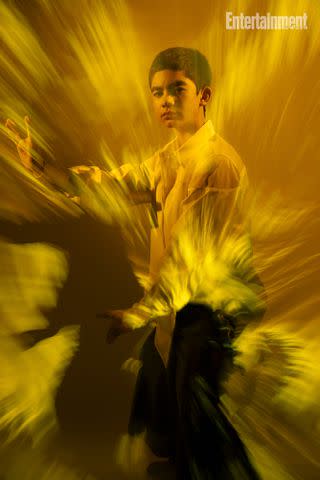
Kim says there’s a good reason this particular event wasn’t depicted on the original show. “It's a cartoon, it's meant for kids,” he notes. “But I felt it was important that we see the event that creates the story of Avatar. The famous line is, ‘Everything changed when the Fire Nation attacked.’ I wanted to see that.” He also clarifies that moments like this do not make his Avatar a dark retelling. He points to episodes of the original, like season 3’s “The Puppetmaster,” which tackled the taboo practice of bloodbending, as well as the series finale battle between Aang and the tyrannical Fire Lord Ozai, leader of the Fire Nation — both of which were more mature than the goofier nature of the first season. “For fans of the second and third season, I think it's all in line with what they saw there,” he says of the live-action reimagining.
Daniel Dae Kim agrees. Having voiced characters in both Avatar animated offerings and now playing live-action Ozai, he says, “The kids who watched the animated version of Avatar are now grown-ups, and so they're ready for more grown-up fare.”
The attack against the Air Nomads is emblematic of Kim’s larger mission with the adaptation: to fill in the gaps from the original, while remixing the material to fit a dramatic series format. Moments that may have occurred off screen or characters that never met in the original are now fair game, though the spirit of the animated series remains. Upon reemerging to find the world in the throes of war, Aang, now the last living airbender, must master all four elements in order to restore peace. To do so will require the aid of his new friends — waterbender Katara and her brother Sokka of the Southern Water Tribe. But he must also contend with the Fire Nation prince, Zuko, who is hellbent on hunting down the Avatar in the hopes of restoring his tainted honor and earning back his father Ozai’s respect.
“I certainly wanted to tap into Zuko’s physicality in the animation,” Liu says, sitting with Cormier in a bathrobe shortly after performing his air flip in L.A. “I just thought it was so perfect for the banished prince to be on edge all the time, stiff and physically fit. But actually, I think I'm quite lucky because I have [original animated series voice actor] Dante Basco’s performance, with his emotional range in the series, to pick what I might like and what to stay away from,” explains Liu, who got the chance to meet Basco in summer 2021 before the start of filming that October. “It was such a rewarding feeling to see how supportive he was of the decisions that I made for the role. He was absolutely cheering me on and wanting me to make it my own.”
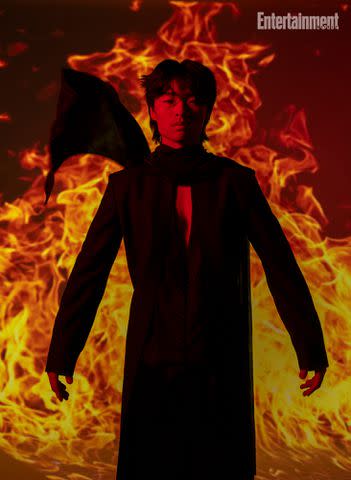
Both Liu and Cormier shaved their heads for the project — Cormier went full bald, while Liu maintained Zuko’s signature bun — though their hair has grown back by the time they speak with EW. “I didn't think too much of it, honestly,” Liu says. “I was just like, ‘I'm bald and I've got a diamond-shaped head and I've got three inches of hair.’ Ian started calling it the joystick on the first day. But it definitely tapped me into my character a lot.”
“I remember, because I was just laughing really hard and pointing. ‘Look at that thing on the back of your head!’” Cormier teases.
Ousley, 21, knew early on what he hoped to maintain in his character from the original. “I wanted to make sure that Sokka is funny,” he says. (Something tells us that wasn’t necessarily a challenge, judging by the laugh he periodically lets out that might sound familiar to Sokka fans.) But, Ousley notes, “There's more weight with realism in every way.” Some things that worked in the more zany animated kids’ show hit differently in live action. Kiawentiio mentions one of them: “I feel like we also took out the element of how sexist [Sokka] was. I feel like there were a lot of moments in the original show that were iffy.”
She’s not wrong. There are entire Reddit threads about such instances, discussing how the original Sokka (prior to his character journey) would make remarks like “Girls are better at fixing pants than guys, and guys are better at hunting and fighting.” Ousley agrees with Kiawentiio: “Yeah, totally. There are things that were redirected just because it might play a little differently [in live action].”
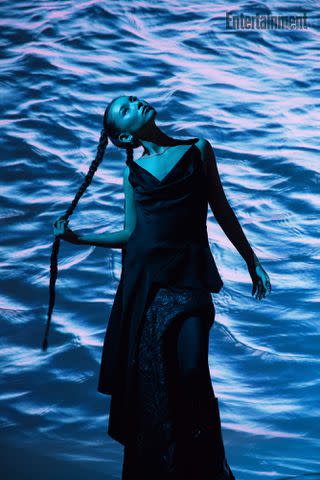
Also playing out differently is the absence of Katara and Sokka’s parents. In the animated series, their mom died when the Fire Nation invaded, and their dad is off fighting in the war. While the cartoon addressed this narrative, the live-action series makes it more of a lingering trauma that affects both siblings. For Sokka, “He’s dealing with what it means to not have his father and try to maybe lead when you're not fully capable,” Ousley says.
“I do feel like it's a recurring theme,” Kiawentiio adds. “It's such a big part of their lives.”
It’s the opposite issue in the Fire Nation: The presence of their father is what torments both Zuko and his sister, Princess Azula. “Ozai is always watching and always judging,” says Daniel Dae Kim. “So you get a sense of how stifling this family can be. He doesn't have a lot of screen time, but you feel him whenever you see Zuko or Azula.”
The Avatar fans have already helped Yu inadvertently. She fell down a rabbit hole of fan-made YouTube videos dissecting the psychology of Azula and Zuko to understand what it would be like for two royals living in this hostile environment. “I thought those were so interesting,” she says. While Zuko is determined to fight his way back into his father’s good graces, his more manipulative and calculating sibling is determined to prove herself to be the more formidable heir to the throne. “A lot of the O.G. series was through the eyes of Zuko,” Yu says. “I feel like our show lets [Azula and Ozai] have their own start to their story before all the stuff that we know them to do later on.… We get to see her origin story, which is really cool.”
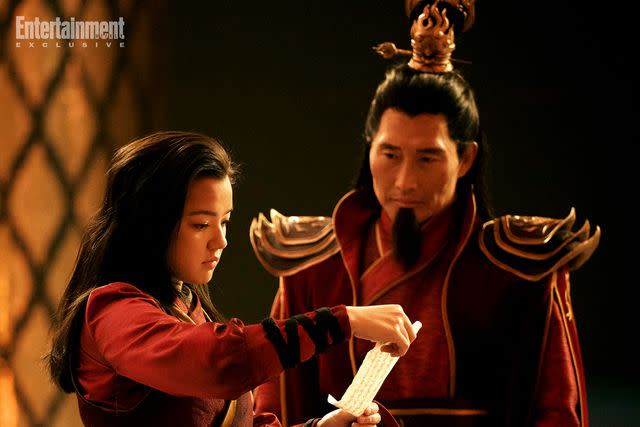
Robert Falconer/Netflix
Elizabeth Yu as Azula and Daniel Dae Kim as Ozai in 'Avatar: The Last Airbender'Having voiced Earth Kingdom officer General Fong on the animated Avatar and Asami’s father Hiroshi Sato on The Legend of Korra, Kim was eager to play a villain like Ozai, whom he refers to as “the Darth Vader of this show.”
“I really enjoyed exploring this idea that he was so unapologetic about the things that he believed in,” the actor says. “It actually reminded me a little bit of our political landscape today because there are certain people who take such extreme positions without apology and with the understanding that their position is the only correct position. That is how Ozai thinks, in a strange way. In his own way, he believes he is parenting the best way he knows how. He is trying to groom his son to be a successor, and he's seeing that his daughter is naturally equipped to succeed him. So he's trying to figure out who is going to lead this nation into the future.”
Outside the show, the Lost alum and Yu have a much healthier relationship. When they first appear over Zoom together, he acts more like a supportive father, commending his onscreen daughter for an impressive performance in Todd Haynes’ May December — playing one of Julianne Moore’s children opposite Natalie Portman and Charles Melton. “I didn’t even know you were in that movie!” he says as they start to catch up. “I'm glad it's getting a lot of love, and I hope you are too.”
“I have imposter syndrome about all of it,” she says, bashfully.
“You definitely shouldn't!” he quickly adds.
In their element
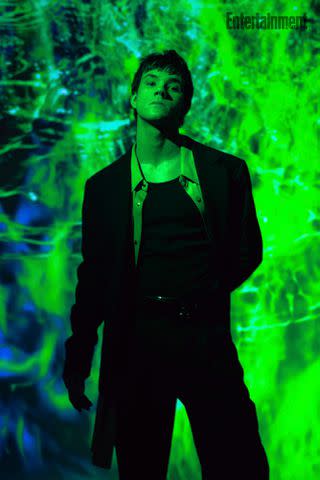
Albert Kim takes pride in filling his cast with entirely Asian and Indigenous actors. That’s partly what excited him about making the show — the prospect of something that could be on par with Game of Thrones or The Witcher, but not rooted in Western folklore. This dream kept him motivated to stay with the series after the departure of original series creators Bryan Konietzko and Michael Dante DiMartino.
Netflix announced Konietzko and DiMartino, both hit makers of animation, as executive producers and showrunners of the live-action Avatar reimagining in September 2018, with plans to start production a year later. But by 2020, they revealed their leave from the project, citing unresolvable creative differences, which made invested fans fear for the fate of the adaptation. The specifics of that story have yet to be told, but Konietzko and DiMartino are still in the Avatar-making business. They launched Avatar Studios in 2021 as a branch of Nickelodeon that’s dedicated to making, at the very least, one new animated show and three animated movies set in the universe.
Traces of the creators’ work on the live-action series still remain. Both are credited as writing the teleplay for the premiere episode with Kim, while Konietzko is credited on the teleplay for episode 6 with Emily Kim and Hunter Ries, based on a story from Konietzko and DiMartino. “When I first got the call, I was really excited just to sit down with them, because I was in such awe of what they had created back for Nickelodeon,” Albert Kim says. “They had done a fair amount of visual exploration, as well as narrative [work] and how to translate the show. I got along really well with them, and we worked together for a while.”
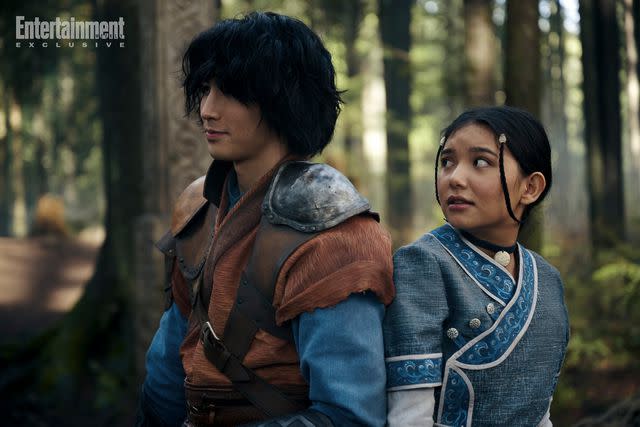
Robert Falconer/Netflix
Sebastian Amoruso as Jet and Kiawentiio as Katara in 'Avatar: The Last Airbender'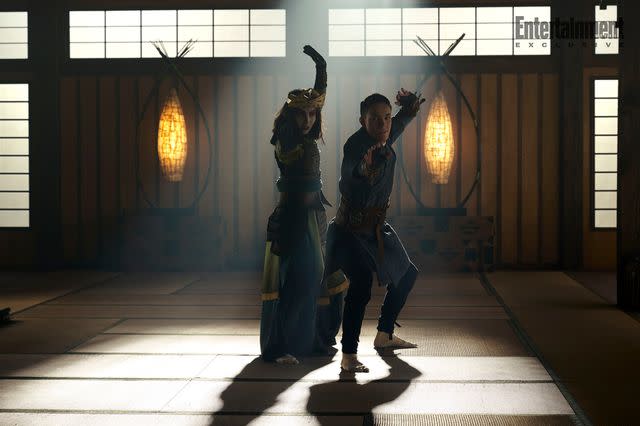
Robert Falconer/Netflix
Maria Zhang as Suki and Ian Ousley as Sokka in 'Avatar: The Last Airbender'The showrunner told EW in December that it “absolutely” felt daunting to take over the project after Konietzko and DiMartino left. “You'd have to be an idiot not to be intimidated a little bit,” he said at the time. “My first reaction after ‘Hell yeah!’ was ‘Holy s---! Do I really want to do this?'” He did, and kept his focus on what new elements he could bring to the Avatar story — coming back to the idea of authentic casting, a goal he shared with his longtime friend, Daniel Dae Kim. “When they told me that was their approach, I saw that this was a chance to bring up a whole new generation of Asian American actors,” the actor says. “It gave me goosebumps because I knew what that meant for AANHPIs [Asian American and Native Hawaiian/Pacific Islanders] all over.”
Albert Kim had many conversations with the original creators before they left, including a discussion about the real-life analogs to every location in Avatar. “A lot of fans tend to assume that the Fire Nation was based on Imperial Japan, but it's not. It's more Southeast Asia,” Kim explains, relaying information he learned directly from Konietzko and DiMartino. “The Earth Kingdom becomes more [like] East Asia: China, Korea, Japan, along with parts of India, Pakistan, the Indian subcontinent there.”
The latter is represented by the city of Omashu, a prominent location from the original, already glimpsed in trailers for the new series. “It's a very varied land. So when we came around to talking about casting for those specific episodes, it was important to me that we find actors from those regions.” Playing some of the Earth Kingdom figures are Utkarsh Ambudkar (Bumi, ruler of Omashu), Danny Pudi (an inventor and engineer known as the Mechanist), Maria Zhang (Suki, leader of the formidable Kyoshi Warriors), and James Sie (the Cabbage Merchant). Much like Daniel Dae Kim, Sie is a living Easter egg. He voiced the Cabbage Merchant in the animated show, becoming a fan favorite for his signature exclamation, “My cabbages!” Now he gets to play the role in live action. “He was probably the biggest celebrity we had on set,” the showrunner says.
Assembling Team Avatar
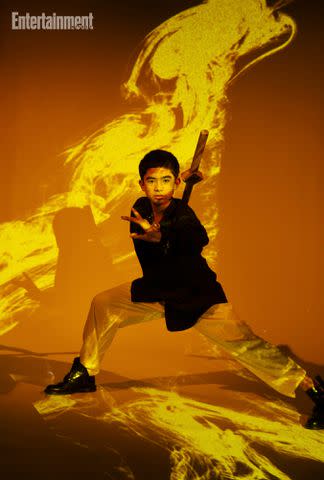
Liu remembers meeting Cormier in the audition phase, when he had chemistry reads with multiple potential Aangs. Both actors were in similar places, as Liu hadn’t landed too many jobs by that point. “I felt like if I hadn't booked the series, I definitely would've taken a break from acting and enrolled full time in school,” says the 22-year-old (who did get a bit of the college experience, deciding to live with Ousley during filming).
For Cormier, it was slightly different. “I actually considered not doing it because I didn't know what it was,” he recalls. “I was a small 11-year-old, and they were looking for a 12-year-old. So I was thinking, I'm not going to book this. I don't fit the casting.”
Kim didn’t have a specific checklist for what he wanted from his ideal Team Avatar. He relied more on what he inherently knew from watching the original series. “You need that childlike sense of optimism for Aang, that wide-eyed sense of wonder. You need that jokester quality for Sokka,” he lists as examples. “The casting process was challenging because we did this all in top secret. I had to write all these fake scenes for the actors to do their auditions, but they hopefully captured some essence of their character. We were unbelievably lucky because when we saw our core four, they all had this ineffable quality about them that made them perfect for their characters.”
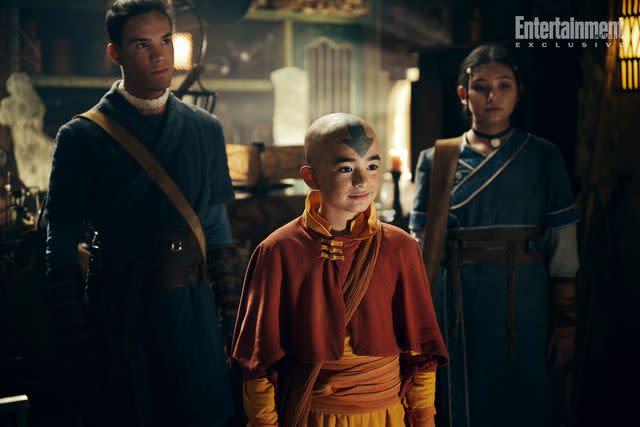
Robert Falconer/Netflix
Ian Ousley as Sokka, Gordon Cormier as Aang, and Kiawentiio as Katara in 'Avatar: The Last Airbender'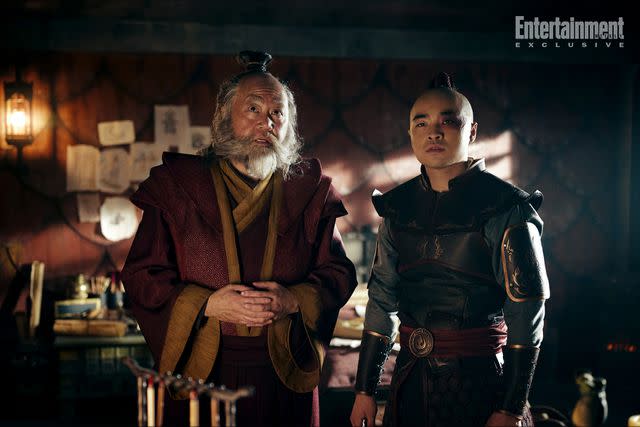
Robert Falconer/Netflix
Paul Sun-Hyung Lee as Iroh and Dallas Liu as Prince Zuko in 'Avatar: The Last Airbender'A second season hasn’t yet been announced by Netflix, but Kim already had to plan for a renewal way back in the casting phase. As he says, he had to consider “all of those fun things that happen to real-life human beings that don't happen to animated characters.” Kim is referring to perhaps Aang’s most formidable foe of all: puberty.
“All three seasons of the animated series essentially take place in the course of one calendar year,” notes the showrunner. “There was no way we could do that. So we had to design this first season, especially, to accommodate the possibility of some time elapsing between the first and the second season.” One way to do that was Sozin’s Comet, which played a prominent role in the animated series. “The comet was their ticking clock,” Kim continues. “We removed that particular ticking clock from our show for now because we couldn't know exactly how old our actors would be for the subsequent seasons.”
In hindsight, the casting seems like the easy part. Actually bringing these characters to life with the appropriate elemental bending was the challenge. To channel the elements, the actors learned different martial arts at “bender bootcamp,” a monthlong training period that took place just prior to filming. Liu describes it as a mix of Northern Shaolin kung fu and wushu styles. Meanwhile, Raisani researched how elements move in the real world.
Having worked on Stranger Things, the EP and visual effects supervisor’s team used a lot of the same fire references — particularly from season 4 when David Harbour lights up a Demogorgon — to dictate the firebending. Though, a single shot involving waterbending in episode 3 proved to be one of the toughest to pull off visually. While Raisani can’t get into specifics, he does tease that “it's just doing something that water really doesn't do. We all understand how water moves in our world. We're purposely defying all the rules, but trying to make it look like it is obeying the rules. It's a really hard thing to get right.”
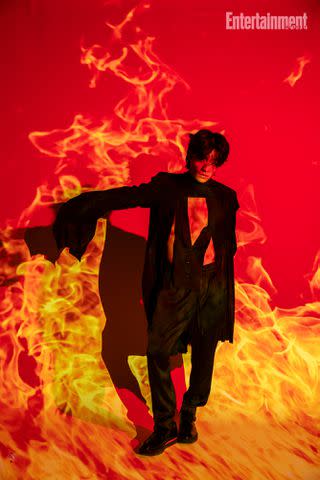
It certainly helps that Raisani is a fan, much like everyone else on Team Avatar, including the crew behind the camera. Though Cormier didn’t know what Avatar was prior to auditioning, he’s since watched the original countless times and ventured into the world of fan-made videos. “Shout-out to the Avatarist,” he says of the YouTube page dedicated to the world of Avatar. “The whole cast watches him, and we really love that guy!” Proving his fandom cred again on set in L.A., he leads Liu, Kiawentiio, and Ousley in a rousing rendition of the song “Secret Tunnel.” (If you know, you know.) It’s not long before the words come flooding back: “Two lovers, forbidden from one another/ A war divides their people/ And a mountain divides them apart…”
“And I forget how the rest goes,” Kiawentiio and Ousley exclaim in unison. Though they may mean that genuinely, that’s also a line from the song. Much like that boomerang, it seems as if everything is coming full circle.
—Additional reporting by Sydney Bucksbaum.
-----------------
Directed by Alison Wild & Kristen Harding
Photographs by Nick Fancher
DP: Kayla Hoff; 1st AC: Jacob Laureanti; Gaffer: Michael Rosner Hyman; BBE: Chris Ginnaven; SLT: Michael Proa; Key Grip: Kevin Paniagua; BBG: Riley Prichard; Grip: Sawyer Hayes; Color Correction: Carlos Flores/Forager; VFX: Ira Morris/finalbyte; Composer: Takeshi Furukawa; Sound Design: Kristen Harding
Production Design: Ward Robinson/Wooden Ladder; Styling: Benjamin Holtrop/The Wall Group; Kiawentiio’s Makeup: Jasmin Winnie Stephen; Hair: Laura Rugetti/The Only Agency; Cormier’s Grooming: Red Phallon Jenkins; Ousley’s Grooming: Patrick Santa Ana; Liu’s Grooming: Tammy Yi/Living Proof/Exclusive Artists
Video Interview: Ryan Bergeron (DP), Jacob Caron (Camera Operator), Jacob Caron, Joe Crabb (Sound), Sydney Bucksbaum (Interviewer), Morgan Sanguedolce (Editor)
Photo Director: Alison Wild; Head of Video: Kristen Harding; Creative Director: Chuck Kerr
Clothing Credits
Header Look
Liu’s Top: Daniel Vi Le; Pants, Coat: Saaf Garments; Cape: Davis Hong; Shoes: Onitsuka Tiger; Ousley’s Jacket: The Archives & Showroom (Private Collection); Shirt: Saaf Garments; Pants: ADEAM; Shoes: Alexander McQueen; Rings: LOUPN & Merchants of the Sun; Necklace: Bear Fruit; Kiawentiio’s Top: Simkhai; Skirt: Monaco + Colombia; Ear Cuff: Malakai; Rings: Vitaly; Shoes: Talent’s Own; Cormier’s Shirt: Iceberg; Pants: Saaf Garments; Shoes: Doc Martens; Necklace: Talent’s Own
Cover Look
Liu’s Top: Saint Laurent; Pants: Daniel V; Necklace: Chanel; Shoes: Alexander McQueen; Rings: Vitaly & LOUPN; Ousley’s Jacket: Dion Lee; Shirt: KWK by KAYKWOK; Pants: ADEAM; Belt: Lorem Ipsum; Shoes: Onitsuka Tiger; Rings: LOUPN; Kiawentiio’s Dress: Sheezen; Shoes: JONAK; Belt: ADEAM; Earrings: Vintage; Earrings: Malakai; Rings: Loupn, BYCHARI, Merchants of the Sun; Cormier’s Shirt: Helmut Lang; Pants: Heurueh; Shoes: Doc Martens
Related content:
See Avatar: The Last Airbender live-action cast side by side with their cartoon counterparts
Avatar: The Last Airbender trailer teases Bumi, angry spirits, and the Avatar State
Live-action Avatar: The Last Airbender boss avoided watching M. Night Shyamalan movie
Read the original article on Entertainment Weekly.
